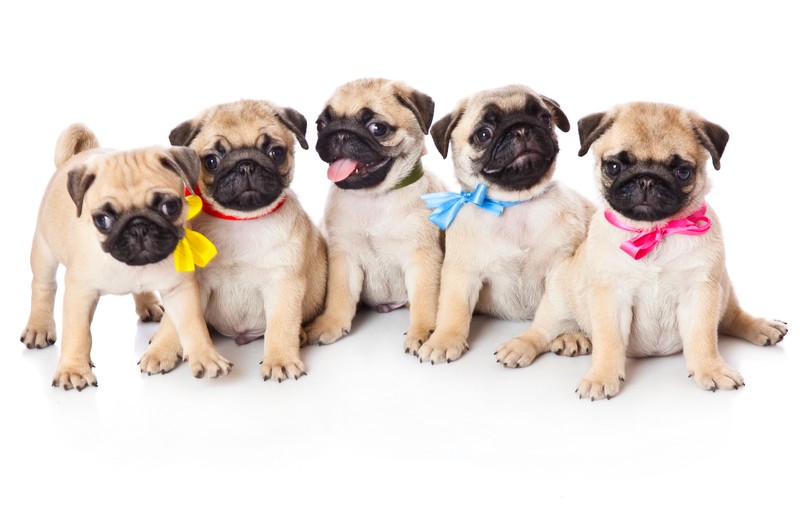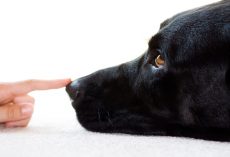Still unsure when to start socializing your puppy? Find out below.
Dogs are altrical and require some time to develop and socialize. However, there are still urgent time limits. Puppies must be socialized before three months of age and sadly, many breeders and owners are missing the boat.
Predictable and Preventable
We know that insufficient early socialization causes hard-to-reverse changes in brain function and anatomy, leading to temperament problems later in life, such as fear and aggression towards people. We know these problems are difficult and time-consuming to attempt to resolve in adulthood, yet may be so easily prevented with ample early socialization and handling. We know that socializing puppies with people is as easy as it is enjoyable.
Regardless of what happened, or didn’t happen, in the breeding kennel, socialization with people is now by far the most crucial item of their pups’ educational agenda. A puppy’s future temperament is pretty much determined during the first three months of life.
So, Why Don’t We Adequately Socialize Puppies?
I think there are a whole slew of reasons why many breeders and owners don’t adequately socialize young puppies, or suitably mold their temperaments to individual tastes. Most people simply don’t see the point of socializing apparently sociable puppies and since the early warning signs of fear and aggression are often subtle and easily missed, no one realizes there is a problem.
Why Socialize Apparently Friendly and Confident Puppies?
Consequently, people are predictably shocked when at about five-and-a-half to eight months of age, their friendly and socialized puppy becomes shy, aloof, wary, standoffish, protective, fearful, reactive and maybe aggressive towards people.
The socialization process is deceptive because all puppies appear to be Mr. or Ms. Sociable at two, three and four months of age and so breeders, veterinarians and owners are unaware that anything is amiss. People are duped by their puppy’s confident and friendly demeanor, not realizing that the effects of insufficient socialization will not become apparent until later in life. But by then of course, it is pretty much too late for quick, easy and effective rehabilitation.
You Can’t Change Genetic Heredity
The Nature/Nurture debate has been going on for several hundred years — essentially, whether good dogs are bred, or raised. Personally, I wouldn’t waste time and energy arguing the issue. I would do both — breed the best and give them the very best upbringing.
Yes, all breeds and types of dog are different but without a doubt, regardless of breed or breeding, the single biggest variable that affects a dog’s temperament and personality and hence, its value and delight as a companion, is whether or not it was adequately socialized, handled and trained as a puppy. Pick any breed or type you like, mixed breed or Malamute, pitbull or Pomeranian, collie or Chihuahua and consider two individuals: one that was socialized and trained as a puppy and one that was not.
Socialization is Too Stressful for Young Puppies
Puppies are highly unlikely to be dangerously stressed by “too much” socialization and handling. On the contrary, it is a lack of early socialization that condemns many puppies to a miserable quality of life. Anxiety towards people is excruciatingly painful for dogs, especially when forced to confront people every day. Also, living with an anxious or fearful dog is not much fun for their owners, who cannot enjoy walking their dogs and even have to put the dog in a different room when people visit.
When over-stimulated or overwhelmed, young puppies simply fall asleep (to solidify the experiences) and then wake up raring to go again. Neonatal handling may cause short-term, slight increases in corticosteroid levels but puppies that were handled regularly as youngsters experience lesser corticosteroid spikes when handled or confronted with novel or fear-invoking stimuli later in life compared with dogs that were seldom handled as puppies. Essentially, early handling sets the “hormonostat” and enables puppies to cope better with stress during adulthood.
We Can Adequately Socialize Our Puppy in Puppy Class
Puppy classes are truly wonderful but they offer too little too late. Puppy classes are not a place to socialize barely socialized puppies. Instead puppy classes provide a safe forum for socialized puppies to continue socialization under the watchful eye of a trainer on the look out for warning signs of incipient temperament problems, especially fearfulness and aggression towards people, so that they may take immediately remedial action.
Denial
Some owners notice warning signs but ignore them, or they euphemistically excuse the puppy’s behavior, thinking that it’s no big deal.
Prevention is the only way — early handling, oodles of classical conditioning and lots of puppy parties with lots of people, especially children, strangers and men. Socialize your puppy to the max. And if you have a breed that has been described as being sensitive, aloof, standoffish, or protective etc., your puppy requires more socialization, not less.
Above all, please remember that neglecting to socialize puppies with people is probably the most abusive thing that we can do to dogs. The effects are crippling and stay with the dog for a lifetime. To paraphrase Frederick Douglas, “It’s easier to build strong puppies than to repair broken dogs.”
It's important to be patient during the puppy socialization process. Be sure to check for warning signs of bad behavior and correct them before it's too late!
For more information on puppy socialization, visit Dogster Daily.











